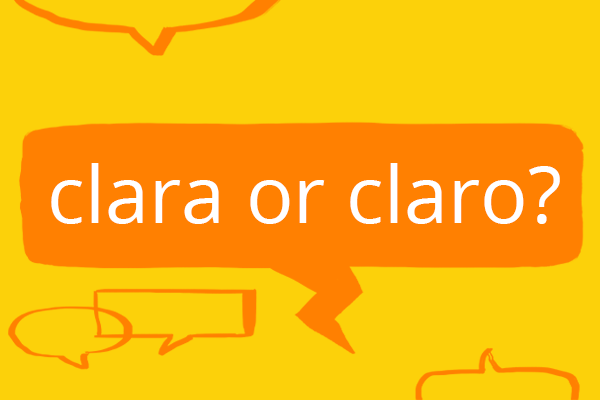As the nights draw in, let’s bring some light and clarity to the commonest senses of another pair of similar-looking Spanish nouns whose meanings differ depending on ending and gender. These are clara and claro.
Let’s start with the feminine, clara, which is pronounced as follows:
Beneath its hard, protective cáscara (shell), un huevo (an egg) contains both la clara and la yema. Given that the adjective claro often means clear, can you guess which of these is the white and which is the yolk of the egg?
Yes, la clara is the egg white (which is clear or transparent until cooked), while la yema is the yolk:
La clara forma el 58% del huevo.
The (egg) white makes up 58% of the egg.
Se bate una clara de huevo en un poco de agua.
You beat the white of one egg in a little water.
Poner 6 yemas sin nada de clara en un bol.
Put 6 yolks with no (egg) white in a bowl.
In Spain, una clara is also something that you can drink: it’s that mixture of cerveza (beer) and gaseosa (lemonade) that in English is called a shandy or a lager shandy:
¿Quieres tomar una clara?
Would you like a shandy?
Leaving egg white and shandy aside, let’s turn to the similar masculine word, claro, which is pronounced as follows:
When talking about the weather, un claro is a spell of clearer, brighter weather; in other words, a sunny spell or a sunny interval:
La previsión es de tiempo seco, con nubes y claros.
The forecast is for dry weather, with clouds and sunny intervals.
Los chaparrones se alternaron con claros de sol.
The downpours alternated with sunny spells.
In a wood or forest, un claro is somewhere where there are fewer trees: a clearing.
Viven en los claros de los bosques, al borde de los caminos y en cualquier paraje despejado.
They live in forest clearings, at the edge of paths or in any open space.
PUZZLE TIME
Claro is more commonly used as an adjective or an adverb than a noun. Can you work out what it means in the following examples? (It doesn’t mean the same in all of them.)
lagos de agua tan clara como el cristal
Estaba claro que Adela comprendía.
una camisa azul claro
En seguida lo vio todo claro.
¿Te gusta? – ¡Claro que si!
ANSWERS
lagos de agua tan clara como el cristal
lakes of crystal-clear water or water as clear as crystal
Estaba claro que Adela comprendía.
It was clear that Adela understood.
una camisa azul claro
a light or pale blue shirt
En seguida lo vio todo claro.
Suddenly he saw everything clearly.
¿Te gusta? – ¡Claro que sí!
Do you like it? – Of course I do!
To clarify usage of another pair of nouns whose meaning varies depending on gender and ending, come back next week.



